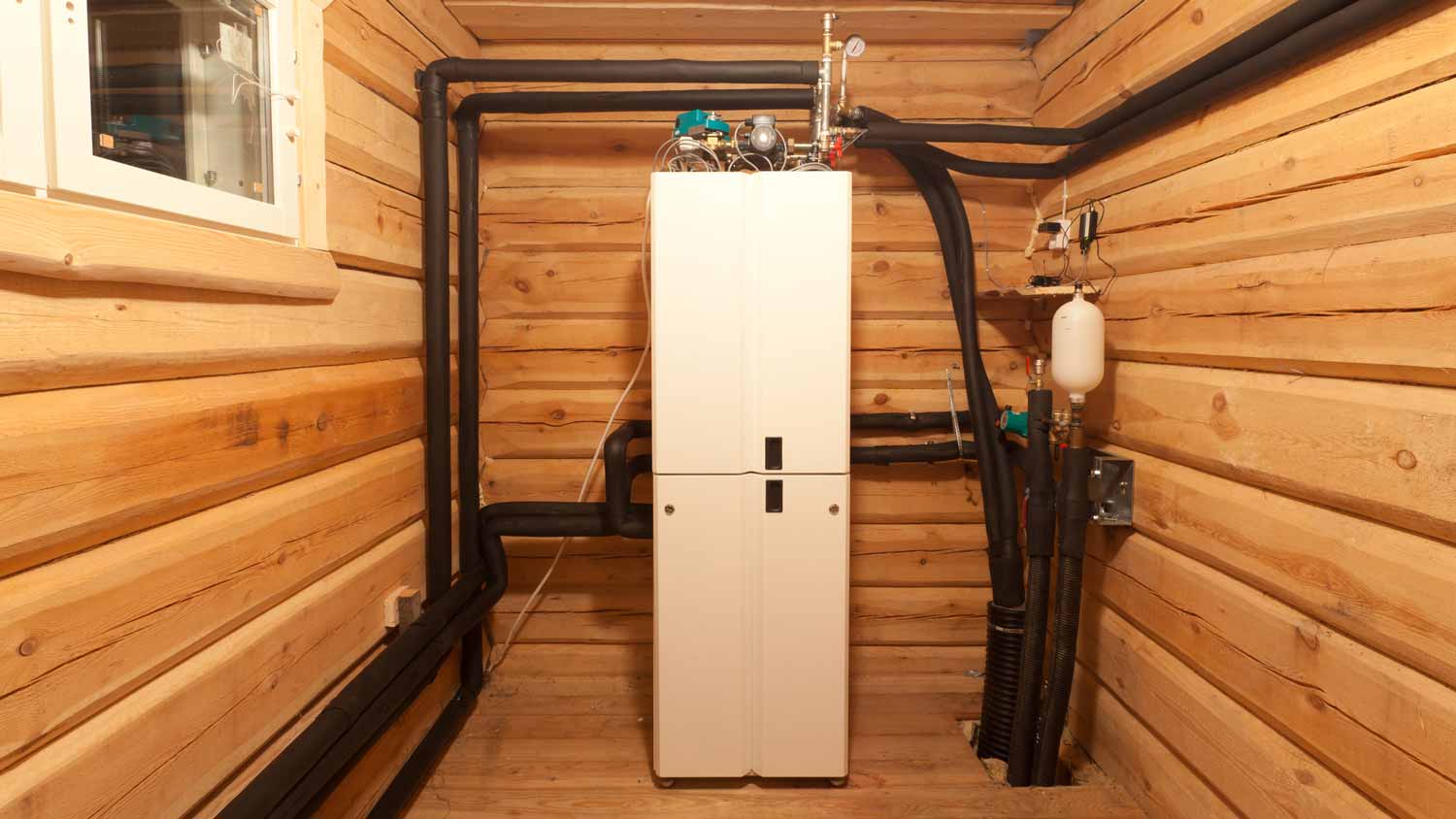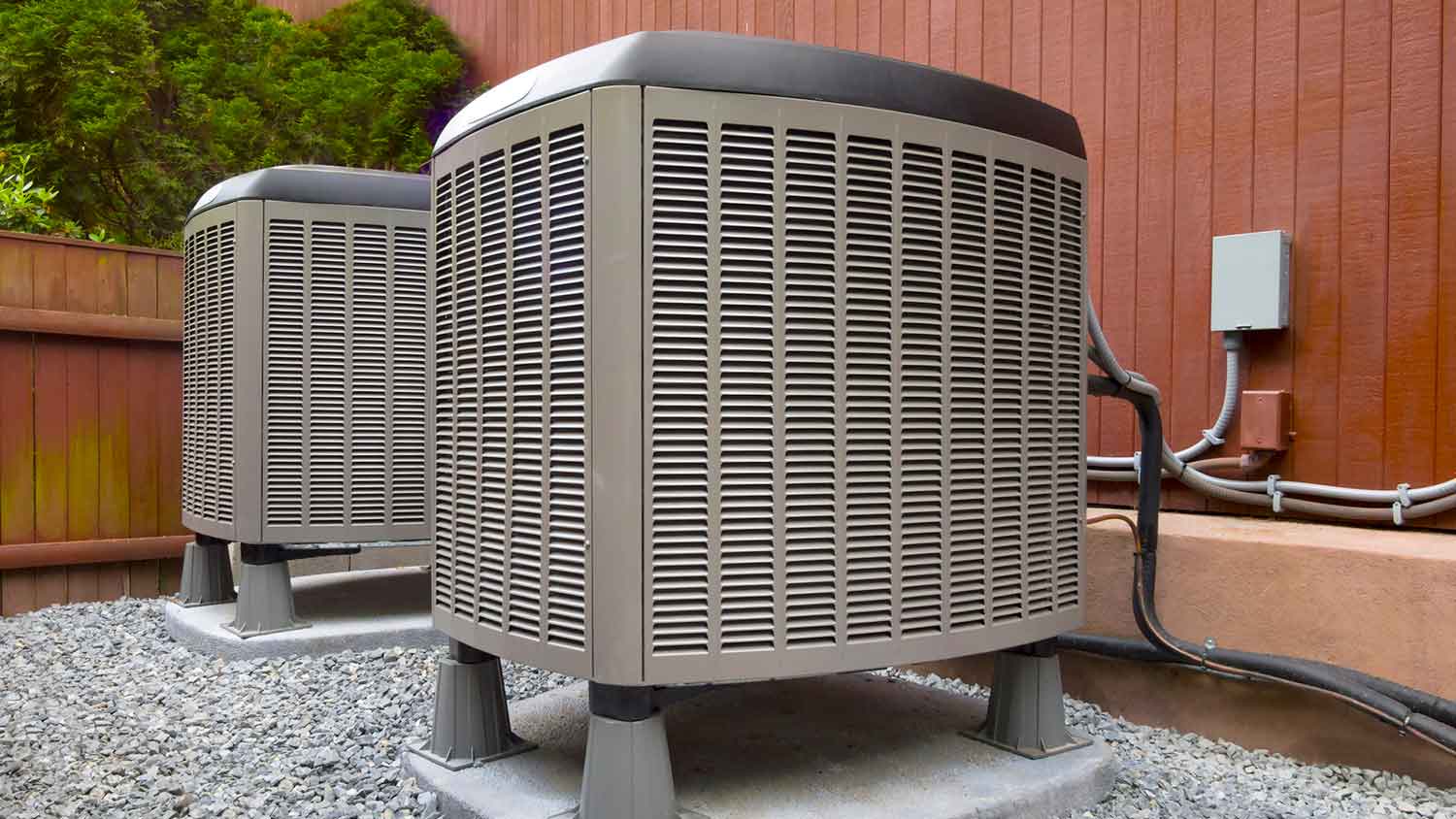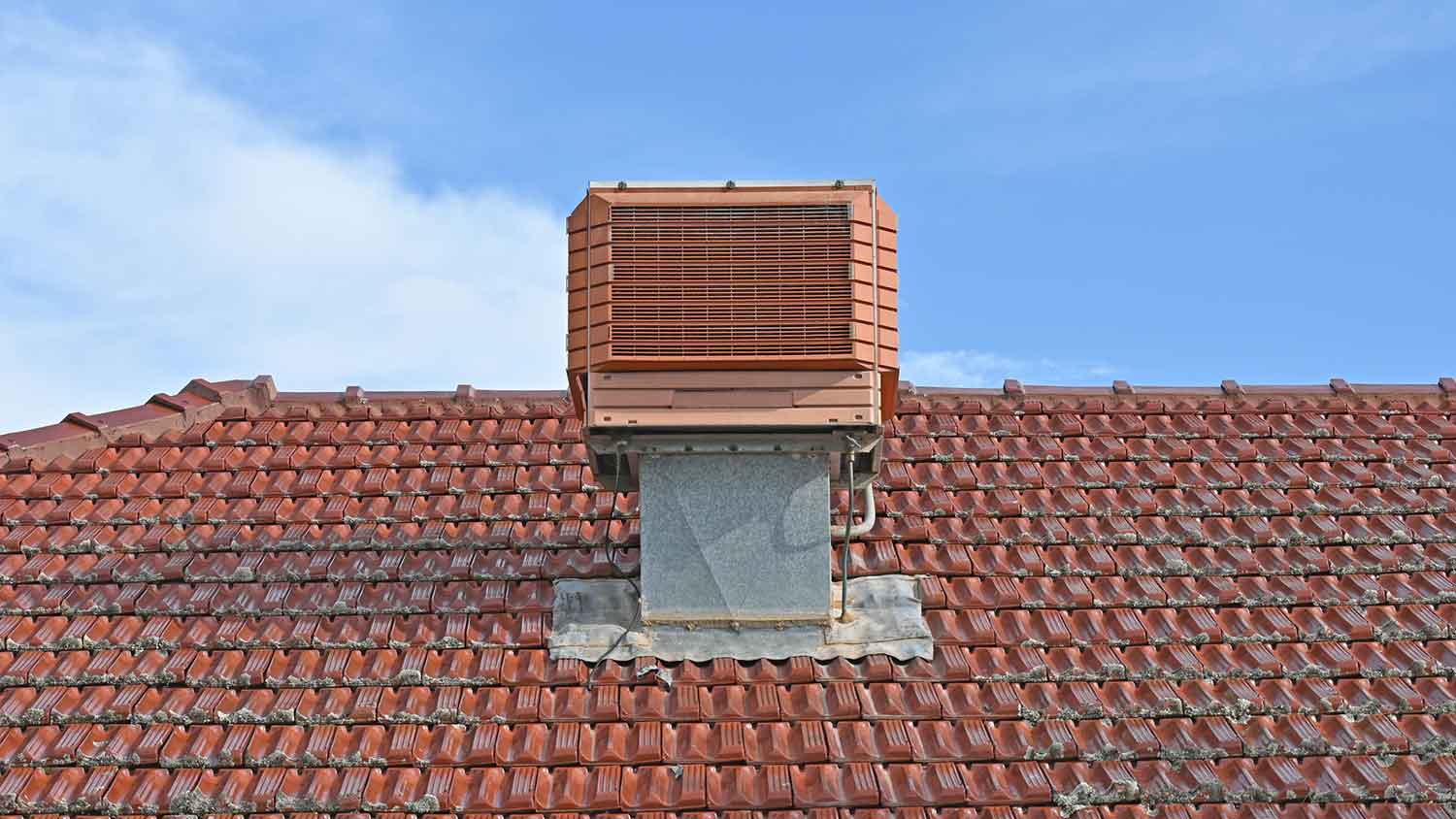
Discover the factors influencing air duct replacement costs in Atlanta, GA. Learn how to save money and make an informed decision for your home's comfort.
Stay cool as you make your decision


Whether you’re installing a new unit or replacing your existing one, the right air conditioner makes cooling your home a breeze. With several types of air conditioners on the market, from mini-splits to window units, a little info can go a long way. Learn all about the different types of air conditioners, their pros and cons, and when to choose each.

A central air conditioning system cools all rooms in a home at once using a split system that sends air through the ducts in your home. The “split” in the name means the system has two units: one indoors and one outdoors.
The indoor unit houses the evaporator coils and an air handler, while the outdoor unit stores the condenser and compressor. A blower pulls the heat out of your home, refrigerant cools the air, and the air handler pushes it through the duct system. Your thermostat controls the system, and smart technology can allow you to adjust the settings and temperature from your phone. The cost of installing a new central air conditioner ranges from $3,900 to $7,900 on average.
| Pros | Cons |
|---|---|
| Efficiently cools entire home at once | High initial installation cost |
| Reduces humidity | Outdoor components can be loud and unattractive |
| Easy to program | High energy consumption and bills |
| Quiet operation | Requires ductwork and occasional maintenance |
Best for: Entire homes and large homes with more than three rooms

A ductless mini-split cools one room or area of your home without ductwork. The system has an outdoor unit with a compressor and condenser, along with one or more indoor wall-mounted units with air blowers. The indoor and outdoor units connect through tubing. Mini-split air conditioners are more energy-efficient for small spaces and limited areas, but they’re not ideal for cooling an entire home. The cost of a mini-split ranges from $2,000 to $14,500.
| Pros | Cons |
|---|---|
| Energy-efficient for zones, large rooms, and apartments/condos | Not large enough to cool an entire home |
| No ductwork required | Wall-mounted units are visible |
| Great for retrofitting older homes or new additions | High purchase and installation cost |
| Easy installation | Lower-performing air exchanger |
Best for: Areas that are hard to keep conditioned, retrofitting old homes, small homes, apartments, attics, and room additions

A window air conditioner is a single unit that rests in a window or through a hole in the wall. The unit disperses heat outside and blows cool air into the room. Window air conditioners are great and cost-effective for cooling a single room or a small area, such as an apartment or condo. There are different types of window air conditioners that come in various sizes, capabilities, and efficiencies, including ones for standard windows and casement windows. Window air conditioners cost $150 to $800.
| Pros | Cons |
|---|---|
| Low cost | Not ideal for large homes |
| Easy DIY installation | Obstructs view |
| Saves on floor space | Can be loud |
| Energy-efficient for small spaces | Needs to be removed or winterized in cold seasons |
Best for: Individual rooms, small spaces, condos, and apartments without central air conditioning

A portable air conditioner is a free-standing single unit that can move from room to room. Portable air conditioners only require a power outlet and access to a window where hot air can disperse outside, although there are ventless portable air conditioners. Portable AC units can be single-hose or dual-hose, expelling hot air outdoors. An evaporator fan runs to get rid of moisture inside the unit. Portable air conditioners can be a great alternative to a window unit or mini-split and cost $100 to $500.
| Pros | Cons |
|---|---|
| Less expensive than most air conditioners | Not effective for cooling large rooms or spaces |
| Easy to use, no permanent installation | Needs to be near a window for the hose exhaust |
| Can move from room to room | Can be noisy |
| Simple to store when not in use | Takes up floor space |
Best for: Small spaces, individual rooms, apartments, condos, and for temporary cooling

A floor-mounted air conditioner features an indoor unit that a pro installs at floor level and connects to an outdoor unit. Floor-mounted units are an alternative to mini-splits since they also don't require ductwork. You can install a floor-mounted unit up to 6 inches off the ground. Floor-mounted AC units cost $1,600 to $3,300.
| Pros | Cons |
|---|---|
| Easy installation that does not require ductwork | Requires free space around the unit for proper airflow |
| Easy to maintain and access the air filters | Not suitable for large rooms or spaces |
| Can create several zones with additional units | More expensive than wall-mounted units |
Best for: Tilted walls, attics, rooms without wall space

A smart air conditioner can be any type of air conditioner that connects to Wi-Fi and comes with a smartphone app for global remote control. Smart air conditioners can be central AC units, mini-splits, wall-mounted, floor-mounted, or portable. Smart air conditioners are highly programmable with energy-saving modes, vacation mode, temperature range control, and more. The cost of a smart air conditioner depends on the type of unit.
| Pros | Cons |
|---|---|
| Highly controllable with a smartphone app | Requires a Wi-Fi connection for smart controls to function |
| Advanced settings for energy saving and temperature control | Can be more expensive than a standard thermostat |
| Easy to use and access | |
| Available with most types of air conditioners |
Best for: Any home with a strong Wi-Fi connection

A geothermal air conditioner system uses insulating properties of the earth by way of a piping system that circulates water between your home, a heat pump, and the ground. The ground temperature 4 to 6 feet underground is consistent all year, and geothermal technology taps into this network. It uses your home's existing ducts to circulate cool air throughout your home and carry heat out of the home.
While ongoing energy consumption and bills are lower, the cost to install a geothermal system ranges from $6,000 to $20,000 or higher. Geothermal systems tend to be the most expensive of all the different types of air conditioners.
| Pros | Cons |
|---|---|
| Cools an entire home through existing ductwork | Very high installation cost |
| Energy-efficient, reducing utility bills | Complex installation that involves digging on your property |
| Longer life span than other types of air conditioners | Not suitable for apartments, condos, and homes with limited property space |
| Cools and heats a home |
Best for: Rural areas, environmentally-focused consumers

A hybrid air conditioner, also called a dual fuel air conditioner, is a system that combines electric heat pumps with a gas furnace. It pulls hot air from inside your home and disperses it outside.
A dual fuel unit automatically (or manually) switches between electric and gas fuel to be the most energy-efficient. During the colder months, the process reverses to provide heat to your home. The indoor and outdoor units look similar to a central air conditioning unit, with plastic feet to lift the unit off the ground for air circulation. Hybrid or dual-fuel air conditioners cost $2,500 to $10,000.
| Pros | Cons |
|---|---|
| Energy-efficient heating and cooling system | High installation cost |
| Can adjust gas usage based on gas prices | More maintenance due to gas and electrical components |
| Built-in backup of either furnace or heat pump | Poor performance in freezing temperatures |
| Lowers carbon footprint and utility bills | Shorter life span |
Best for: Entire homes, consumers focused on energy-efficient solutions and lower long-term utility bills

An evaporative air cooler, also known as a swamp cooler, draws in warm air and cools it through water-saturated pads. Then, the system pushes cool, humid air into a room. Evaporative air conditioners are great for dry environments because they increase the humidity in a home. Some experts don't consider these to technically be air conditioners, although they’re an alternative option and do cool homes. Evaporative coolers cost $1,500 to $3,700 or more.
| Pros | Cons |
|---|---|
| Uses less electricity than other types of air conditioners | Uses a lot of water and needs regular refilling |
| Suitable for dry climates because it adds moisture to dry air | Can only use in dry climates |
| Available as a portable or whole-home unit | Not as powerful as standard air conditioners |
| Lowers carbon footprint |
Best for: Dry climates, both small spaces and entire homes
The best type of air conditioner depends on the size of the space you're cooling. You also want to consider how energy-efficient each unit is and your budget for installation. Here are the main factors to consider when choosing a type of air conditioner.
Not only does the upfront cost of an AC matter, but ongoing energy bills play a role in the unit’s lifetime expense. Look for the Season Energy Efficiency Rating (SEER) on the product to estimate the average cost of utility bills. The higher the SEER rating, the less you’ll spend on running the air conditioner. AC units with the highest SEER rating will have Energy Star ratings. While Energy Star-rated units may cost more upfront, they use 9% less energy on average, creating significant savings over the air conditioner's lifetime.
What is the most efficient type of air conditioner overall? That would be geothermal air conditioning, although the systems are very expensive to install. A mini-split is the second most energy-efficient and is great for cooling a room or zone in a home. Central air conditioning systems can be energy-efficient when set to energy-saving mode. They often offer the best balance of efficient whole-home cooling and budget-friendliness.
Ensure the air conditioner you choose is powerful enough to cool the entire space you want to condition, whether it's your whole home or a single room. Look at the cooling capacity ( measured in BTUs) or the square footage that the air conditioner can cool. The higher the BTUs, the more cooling power a unit has. Contact a local AC installer who can calculate the size of the air conditioner you need for your home.
Consider a window unit, portable air conditioner, or mini-split system if you only have one or two rooms to cool or need temporary cooling. A central air conditioner is often the best choice if you're looking to cool an entire home. However, some people choose a geothermal or evaporative air conditioning system in suitable climates.
All air conditioning systems need maintenance at some point, but some need more than others. Evaporative cooling systems, for example, need to be continually refilled with water or ice. Geothermal systems need the least maintenance but are the most expensive to install. Mini-splits and portable units require few repairs, while central air conditioning may need duct cleaning every three to five years.
A new AC costs between $3,900 and $7,900 on average, though some high-efficiency, fully upgraded AC systems can cost more than $10,000. But you can also find less expensive alternatives for small spaces, such as portable units that cost as little as $100. If you need to install new ductwork, the cost falls between $3,000 and $7,500 for 300 linear feet. Compare prices of air conditioners and their ongoing energy costs.
If it gets scorching hot where you live, you may want to opt out of a portable or window AC unit. Central air or a ductless mini-split system is best for keeping a southern house cool in the summertime. If you live in a cooler region, a smaller system like a portable AC might be a good option, especially if it’s a smaller space. If you live in a dry climate, consider an evaporative cooler, which adds moisture to the air.
Some ACs are noisier than others, so read reviews or talk with a pro before you buy one. Conventional central air conditioners and ductless mini-split systems are quiet, with noisy components residing outside the home.
A local air conditioner installer can help you choose an AC that fits your needs, climate, and budget. Hire an HVAC pro who can offer you estimates for the best air conditioning system for your home.
From average costs to expert advice, get all the answers you need to get your job done.

Discover the factors influencing air duct replacement costs in Atlanta, GA. Learn how to save money and make an informed decision for your home's comfort.

What you’ll pay in Atlanta, Georgia, for furnace repairs depends on many factors. Here’s a breakdown of what can go wrong and the cost to fix those issues.

Find out the average humidifier repair cost, what impacts pricing, and how to save. Get expert tips to budget for your humidifier repair.

A problem with your heat pump can lead to a house that’s too cold or too hot. Learn the most common heat pump problems—including any weird noises—and their solutions.

Figuring out how to eliminate ductwork noise may require anything from replacing the ducts to changing the filter. Learn more about fixing this issue.

Having dirty evaporator and condenser coils works your HVAC system harder than it needs to. Here’s how to clean your air conditioner coils like a pro.